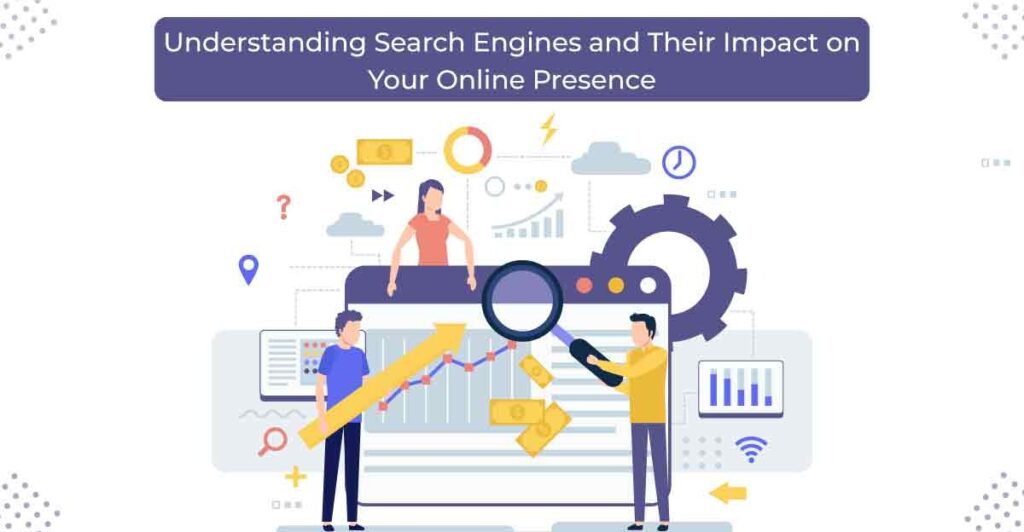In the digital age, search engines are pivotal in shaping an organization’s online presence. Understanding search engine optimization (SEO) is crucial for maintaining visibility and relevance in today’s competitive landscape, from small businesses to multinational corporations.

Understanding SEO Marketing:
Leveraging Strategies for Digital Success
Introduction to Search Engines :
What are search engines?
Search engines are sophisticated software programs that crawl, index, and rank web pages based on various algorithms. They enable users to discover relevant information by entering queries or keywords.
Importance of search engines in online presence
With billions of searches conducted daily, search engines serve as gatekeepers to online content. Websites that rank higher in search engine results pages (SERPs) tend to receive more organic traffic, leading to enhanced visibility and brand recognition.
Understanding Search Engine Optimization (SEO) :
Definition of SEO
SEO encompasses a range of strategies and techniques aimed at improving a website’s visibility and ranking in organic search results. It entails optimizing a website’s numerous elements to be in line with user intent and search engine algorithms.
Components of SEO
Effective SEO involves on-page and off-page optimization. On-page factors include keyword optimization, content quality, and HTML tags, while off-page factors encompass backlinks, social signals, and online reputation management.
Importance of SEO in digital marketing
In the realm of digital marketing, SEO serves as a cornerstone for driving organic traffic and generating leads. By optimizing web properties for search engines, businesses can enhance their online presence and outperform competitors.
The Role of Keywords :
What are keywords?
Keywords are words or phrases that people enter into search engines to locate pertinent content. Conducting thorough keyword research is essential for identifying high-traffic keywords with low competition.
Keyword research
Keyword research involves analyzing search volumes, competition levels, and user intent to identify strategic keywords for optimization. SEMrush and Google Keyword Planner are two tools that might help with this process.
Keyword optimization techniques
Integrating keywords naturally into website content, meta tags, and headers is crucial for signaling relevance to search engines. However, keyword stuffing should be avoided, as it can harm user experience and result in penalties.
On-Page SEO Factors
Title tags and meta descriptions
Title tags and meta descriptions serve as snippets that appear in SERPs, influencing click-through rates and user engagement. Crafting compelling titles and descriptions with relevant keywords can improve visibility and clickability.
URL structure
A clear and concise URL structure enhances user experience and facilitates search engine crawling. Descriptive URLs containing relevant keywords can boost rankings and convey the content’s topic.
Content optimization
Creating high-quality, informative content that addresses user queries is paramount for SEO success. Incorporating relevant keywords, headers, and multimedia elements can enhance readability and engagement.
Image optimization
Optimizing images with descriptive filenames, alt text, and captions can improve accessibility and contribute to overall SEO efforts. Compressing images for faster loading times also enhances user experience.
Off-Page SEO Strategies
Link building
Building quality backlinks from reputable websites signals authority and trustworthiness to search engines. Outreach, guest blogging, and content promotion are common strategies for acquiring backlinks.
Social media presence
Maintaining an active presence on social media platforms can amplify content reach and engagement. Sharing valuable content and fostering community engagement can indirectly impact SEO through increased brand visibility.
Influencer collaborations
Partnering with influencers or industry experts can amplify brand exposure and attract quality backlinks. Collaborative content creation and influencer endorsements can bolster credibility and trustworthiness.
Local SEO :
Importance of local SEO
For businesses targeting local markets, optimizing for local search is imperative. Local SEO tactics such as optimizing Google My Business profiles and obtaining local citations can improve visibility in geographically relevant searches.
Optimizing Google My Business
Creating and optimizing a Google My Business listing with accurate business information, reviews, and photos can enhance local visibility and drive foot traffic to physical locations.
Local citations and directories
Ensuring consistent NAP (name, address, phone number) information across online directories and citation sources can improve local search rankings. Listings on platforms like Yelp, Yellow Pages, and TripAdvisor can boost local visibility.
SEO Analytics :
Tools for tracking SEO performance
A plethora of tools, including Google Analytics, Google Search Console, and SEMrush, provide insights into website traffic, keyword rankings, and user behavior. Utilizing these tools can inform data-driven SEO strategies.
Metrics to monitor
Key SEO metrics to monitor include organic traffic, keyword rankings, backlink profiles, and conversion rates. Analyzing trends and patterns over time can help identify areas for improvement and optimization.
Adjusting strategies based on analytics
Regularly analyzing SEO performance metrics allows for iterative refinement of strategies. Identifying underperforming keywords, pages, or tactics enables marketers to pivot and reallocate resources effectively.
Understanding SEO Marketing :
Integration of SEO into marketing strategies
Incorporating SEO into broader marketing initiatives ensures alignment and synergy across channels. Integrating SEO with content marketing, social media, and paid advertising maximizes visibility and ROI.
Importance of content marketing in SEO
Content marketing plays a pivotal role in SEO by providing valuable, relevant content that attracts and engages audiences. Creating high-quality, shareable content fosters backlinks and social signals, driving organic traffic and rankings.
SEO’s Impact on Online Presence :
Visibility on search engine results pages (SERPs)
Ranking prominently in SERPs increases visibility and organic click-through rates, leading to enhanced brand exposure and traffic. Consistent SEO efforts result in sustained visibility and relevance over time.
Increased website traffic
Organic search traffic generated through SEO tends to be highly targeted and valuable, as it originates from users actively seeking information or solutions. Optimizing for relevant keywords and user intent drives qualified traffic to websites.
Building brand authority and trust
Websites that consistently provide valuable, authoritative content and adhere to SEO best practices earn trust and credibility with both users and search engines. Building brand authority enhances online reputation and fosters customer loyalty.
The Importance of Advanced Digital Marketing Courses :
Overview of digital marketing courses
Advance Digital Marketing Course In Jaipur offers comprehensive training in SEO, content marketing, social media, and other key disciplines. They equip individuals with the skills and knowledge needed to excel in today’s competitive digital landscape.
Choosing the best SEO course in Jaipur
When selecting the Best SEO course In Jaipur, factors to consider include curriculum relevance, instructor expertise, hands-on experience, and industry recognition. Researching reviews and testimonials can help gauge the course’s effectiveness and value.
Advantages of advanced digital marketing training
Advanced digital marketing courses provide practical insights and strategies for executing effective SEO campaigns. Hands-on learning opportunities and industry certifications enhance employability and career advancement prospects.
Future Trends in SEO :
Voice search optimization
With the rise of voice-enabled devices and virtual assistants, optimizing for voice search queries is becoming increasingly important. Tailoring content to match natural language queries and implementing structured data markup improves visibility in voice search results.
Mobile-first indexing
Google’s mobile-first indexing prioritizes the mobile version of websites for ranking and indexing. Ensuring mobile responsiveness, fast loading times, and intuitive navigation enhances user experience and search engine visibility.
Artificial intelligence in SEO
Advancements in AI and machine learning are reshaping SEO practices, enabling more sophisticated algorithms and predictive analytics. Leveraging AI-powered tools for keyword research, content optimization, and user personalization enhances SEO efficiency and effectiveness.
Common SEO Mistakes to Avoid :
Keyword stuffing
Overloading content with excessive keywords in an attempt to manipulate rankings can result in penalties from search engines. Focus on creating valuable, user-centric content rather than keyword density.
Neglecting mobile optimization
Since mobile devices are used by the majority of internet users to access information, ignoring mobile optimization can result in subpar user experiences and decreased search engine results. Prioritize mobile responsiveness and usability in website design and development.
Ignoring user experience
User experience (UX) is a critical factor in SEO, as search engines prioritize websites that deliver positive experiences to visitors. Factors such as page speed, navigation ease, and content relevance directly impact rankings and engagement.
Case Studies and Success Stories
Examples of companies that have benefited from SEO tactics that work
Case studies illustrating the transformative impact of SEO on businesses of various sizes and industries provide valuable insights and inspiration. Real-world examples demonstrate the tangible benefits of investing in SEO for long-term growth and success.
Conclusion
In conclusion, understanding search engines and SEO’s Effect on Online Presence and achieving digital marketing success. By optimizing your website for search engines, leveraging strategic keywords, and producing high-quality content, you can attract organic traffic, build brand authority, and outperform competitors. Investing in advanced digital marketing course can further equip you with the skills and knowledge needed to navigate the ever-evolving digital landscape and stay ahead of the competition.






